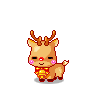Personally, I'm reading this story because I find the black-bellied older brother really interesting. He's essentially the driving force of the story, and is the plot itself. It's not a light-hearted story, and that's part of its charm.
Jigeon basically played 4D chess, to crack an opening in Wooseo's heart for him, set up the board so that Wooseo starts falling for him, and then set up the reveal because he wants Wooseo to know his truest depths, leaving the last decision to Wooseo, because if Wooseo can still accept him and love him for what he really is like, then their relationship/bond will finally be physically and emotionally solidified. Honestly? Fun plot.
But I want to reiterate that not once did he force anyone's hand. Every decision each character made was their own decision. Jigeon only had a hand with the time and place. He never forced Wooseo into anything and has otherwise only been good to him.
And the reason I like and prefer Jigeon is because of this honesty to himself. He's sure of what he wants, and he doesn't want to lie to himself. He's never presented in any way to the readers other than what he really is. And if things were going to go south, he's willing to accept and take responsibility for that too, because that's what he's committed to.
I really dislike characters that are put in a "good light" but their actions don't line up, and vice versa, I don't like bad guys who only have their tragic backstory as justification. Jigeon is always ready and willing to own up to his own actions.
Jigeon may not be a good person, but I don't think being with a bad person leads to a toxic relationship. There are plenty of characters in relationships with bad guys that have a perfectly mature and happy relationship. It's thinking about the balance between the two parties in the long run. Wooseo didn't feel resigned, he had a choice and he chose to accept everything about the person he loves, both the good and bad.
I really like the main couple. The brat MC gets a lot of growth and understanding as the story progresses. The two fall in love naturally and gradually and has great chemistry. But dear god --- I loath the side couple with a burning passion. They don't add to the story or the plot, they're not cute, they're distracting, and when they ARE in a panel with the main pair, they're super KY annoying. Like I could not give a shit about this side couple more and wish they got written out permanently.
There's no summary, so, before I start to read this,
Is it another one of those "oh she dumped me. NOW I FIND HER SO INTERESTING!"...sort of situation....?
hmm kind of? but not in the asshole way like it usually is. hes more confused and doesn’t realise that he kind of likes her in a way? and he’s not so bothered over the break up i think he’s more interested since she changed and he wants to figure that out but i’m not sure. anyways it’s nice and not really like the other ones <3











I think it's kind of refreshing they didn't make her lose weight automatically and be skinny in like 5 chapters, and it seems she's genuinely working out very hard each day.
Anyway, I'm not really sure how big she would be in reality, but having a bit of body weight in Historic European culture was actually not uncommon because their diet consisted of really high-calorie foods (in actuality, peasants ate much healthier meals consisting of fish, seafood, and other shrubberies). But given this is a Korean manwha, maybe the author didn't research very much. In most historic paintings, the women depicted are actually quite plump, but I'm sure ridicule for being overweight has also existed for centuries.
...Basically people who were wealthier, ate kind of fattier meals consisting of sugar, carbs and meats (because sugar and spices were a more expensive commodity at the time, and it was kind of a status thing). If you were plump in those days, it presumably just meant you were well-fed and well off. But for peasants, cows and chickens were household treasures for their milk and eggs and they wouldn't dare eat them except on special occasions (eg. a hunting festival), so most of their diet was stuff that were plentiful and forageable.
Can you imagine how the times have reversed now where chicken is a cheap meal, but seafood like crab and lobster are twice as expensive?